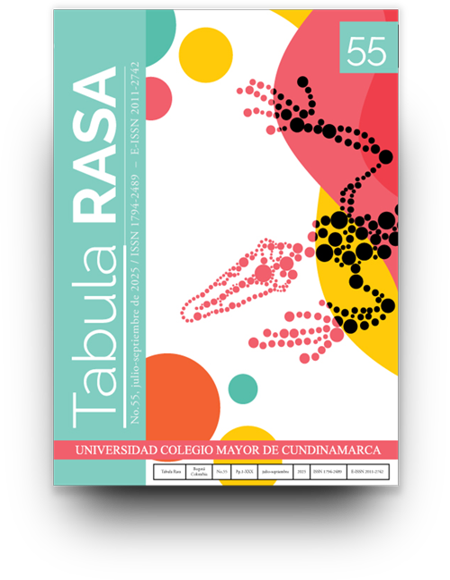Making a Case for Shaming: An Analysis of Shaming and Vindictive Discourse Targeting Left-Wing Militants
Cuando la funa es el argumento: análisis del discurso de la funa y el punitivismo contra activistas de izquierda

This work is licensed under a Creative Commons Attribution-NonCommercial-NoDerivatives 4.0 International License.
Show authors biography
This research article explores the recurring discursive mechanisms in the digital space that seek to stigmatize, punish, and delegitimize activists following an opinion or action deemed politically incorrect or inconsistent with their public image. This is achieved through a discourse critical analysis as a theoretical-methodological approach. Particularly, we analyze the cases of three left-wing activists in Mexico who had fingers pointed at them by various online shaming campaigns. The critical analysis was applied to a corpus made up of 120 representative posts in social media that were a part of the interactions related to those shaming interactions. Among the most salient findings, we highlight that the cases under study are clear evidence that using online shaming and pointing fingers at socially banned behaviors or individual features as key to undermine the legitimacy of the discourse and actions by activists. Attacking the emitter rather than the message has as an ultimate effect to have these people suffering the attacks refraining from participating in public fora and hindering the continuity of their activism.
Article visits 60 | PDF visits 31
Downloads
- Barrera, L. V. & Rodríguez, C. (2017). Internet es nuestra: Informe para la Relatora sobre Violencia contra las Mujeres Ms. Dubravka Šimonović sobre violencia en línea contra las mujeres en México. Luchadoras. https://luchadoras.mx/wp-content/uploads/2024/10/Informe_ViolenciaEnLineaMexico_InternetEsNuestra.pdf
- Cabrera Peña, K. I. & Jiménez Cabarcas, C. A. (2021). La cultura de la cancelación en redes sociales: Un reproche peligroso e injusto a la luz de los principios del derecho penal. Revista Chilena de Derecho y Tecnología, 10(2), 277. https://doi.org/10.5354/0719-2584.2021.60421
- Crenshaw, K. (1991). Mapping the Margins: Intersectionality, Identity Politics, and Violence against Women of Color. Stanford Law Review, 43(6), 1241. https://doi.org/10.2307/1229039
- Dudenhoefer, N. (2020). Is cancel culture effective? Pegasus Magazine. https://www.ucf.edu/pegasus/is-cancel-culture-effective/
- Foucault, M. (2016). Vigilar y castigar. El nacimiento de la prisión. Siglo Veintiuno Editores.
- Foucault, M. (2023). El orden del discurso. Tusquets Editores.
- Jancik, I (2020). Feminismo y punitivismo. Análisis del surgimiento de funas a varones en Argentina. Revista Némesis, 16, 49-59. https://revistanemesis.uchile.cl/index.php/RN/article/view/61747
- Jaramillo Molina, M. E. (2024). Pobres porque quieren. Mitos de la desigualdad y la meritocracia. Grijalbo.
- Moguel Osorio, L. E. & Ramírez Vanegas, A. (2022). Palabras impunes: Estigmatización y violencia contra mujeres periodistas en México 2019-2022. Comunicación e Información de la Mujer A.C. Cimac. https://cimac.org.mx/wp-content/uploads/2022/11/Informe_CIMAC_2022_AMLO_Estigmatizacion.pdf
- Organización de los Estados Americanos (OEA) & ONU Mujeres. (2022). Ciberviolencia y ciberacoso contra las mujeres y niñas en el marco de la Convención Belém do Pará. Iniciativa Spotlight. https://www.oas.org/es/mesecvi/docs/mesecvi-Ciberviolencia-ES.pdf
- Oxfam México (2024). El monopolio de la desigualdad. Oxfam México. https://www.oxfammexico.org/wp-content/uploads/2024/01/El-monopolio-de-la-desigualdad-Davos-2024-Briefing-Paper.pdf
- Pardo Abril, N. G. (2007). Cómo hacer análisis crítico del discurso: una perspectiva latinoamericana. Frasis.
- Pereyra, S. (2008). ¿La lucha es una sola? La movilización social entre la democratización y el neoliberalismo. Biblioteca Nacional Universidad Nacional de General Sarmiento.
- Pitch, T. (2025). El malentendido de la víctima. Una lectura feminista de la cultura punitiva. Universidad Nacional Autónoma de México Unam – Tinta Limón Ediciones.
- Salas, D., Albornoz, D. & Huaranga, E. (2020). Kit de cibercuidado para activistas. Hiperderecho. https://hiperderecho.org/wp-content/uploads/2020/11/Kit-de-cibercuidado-para-activistas-.pdf
- Scolari, C. (2008). Elementos para una teoría de la comunicación digital interactiva. Gedisa.
- Scolari, C. (2017). El translector. Lectura y narrativas transmedia en la nueva ecología de
- la comunicación. Hipermediaciones. https://hipermediaciones.com/2017/03/02/el-translector-lectura-y-narrativas-transmedia-en-la-nueva-ecologia-de-la-comunicacion/
- Souza, L. & Varon, J. (2021). Violencia política de género en Internet: Policy Paper América Latina y el Caribe. Al Sur. https://www.alsur.lat/sites/default/files/2021-07/Violencia%20Pol%C3%ADtica%20de%20G%C3%A9nero%20en%20Internet%20ES.pdf
- Van Dijk, T. (2010). Análisis del discurso del racismo. Crítica y Emancipación, 2(3), 65-94. https://biblioteca-repositorio.clacso.edu.ar/bitstream/CLACSO/16125/1/CyE3.pdf
- Van Dijk, T. (2013). Discurso y poder. Contribuciones a los estudios críticos del discurso. Gedisa.
- Weis, V. W. (2021). Criminalization of activism: Historical, present, and future perspectives. Routledge. https://doi.org/10.4324/9781003144229
- World Inequality Database (2025). Top 10% national income share. WID. https://wid.world/
- Zaffaroni, R. (2000). Tratado de Derecho Penal. Ediar.








